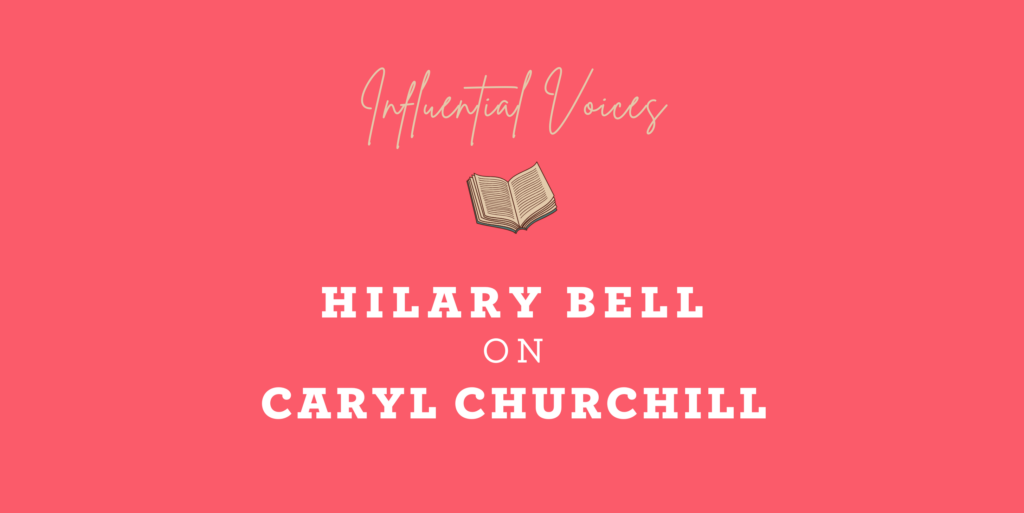
It’s easy to name individual plays I love by many playwrights. But there aren’t a lot whose work consistently grips and surprises me. Why should they? As writers we’re all building kingdoms out of thin air; it’s only to be expected that some won’t stand up.
But Caryl Churchill is one writer who never fails me. Everything she’s produced — from her earliest plays to the present day — is not only a bold adventure into the unknown, it extends the possibilities of what theatre can do.
Churchill is still game-changing at 77. She continues to unflinchingly engage with the world in all its beauty and terror, in ways sometimes playful, sometimes outraged and angry, but never nihilistic. To do all these things in the course of producing consistently groundbreaking work is nothing short of astonishing.
She began with radio plays in the 1960s. These aren’t a substitute or calling-card for the stage, but rather, they completely embrace the medium. She turns radio’s limitations into advantages. Schreber’s Nervous Illness employs the sufferer’s imagined ‘nerve rays’ as characters; Not Not Not Not Not Enough Oxygen takes place in a room where fresh air is a pricy commodity (sadly prescient).
Her writing for theatre is singularly theatrical. It isn’t adaptable to film; it demands a stage. She exploits and subverts theatre’s conventions: A Number (2002) comprises two men having a conversation, nothing more. But in Scene 2, the younger man (same actor) turns out to be a clone. She’s playing with our minds, presenting something outwardly unremarkable, while provoking mental gymnastics.
My favourite — which I’ve never seen staged, I’ve only read many times — is The Skriker (1994). It’s about two teenage mothers encountering an ancient fairy, who works its way into their lives, possessing them. It’s an extraordinary metaphor for mental illness. It never touches the surface, but skips along in a flurry of bizarre and beautifully invented language.
Some directors would argue that the demands she makes are beyond theatre’s capabilities: one stage direction reads, There is a SPRIGGAN, grotesquely ugly and 10 foot tall, who is invisible to LILY, having a drink. But this only demonstrates her importance as a writer: she challenges her collaborators and her fellow playwrights to stretch beyond the safe, practical, logical and tidy.
It’s telling that Churchill collaborates with such a range of people, artists of other disciplines as well as students and communities. This implies a generosity, a curiosity, a willingness to cede control in favour of experimentation.
Love and Information (2012) places trust entirely in the hands of actors and director, leaving them the dizzying freedom to create characters, relationships, even structure.
I was a fan long before I became a mother, but now I can appreciate what it means to have sustained an artistic career while she raised three children. How did she do it? How did she not only find the time to work, but the mental space to construct those airy kingdoms?
I met her briefly 15 years ago, soon after the birth of my first child. I had the chance to ask one question: with young children, how did she find the wherewithal to write? She replied, ‘Any spare second you get, write. Leave the dirty dishes, the unmade bed. Spend the time writing.’
Churchill has reset the boundaries of what theatre is. She uses it to dazzle our minds and make us rethink received ideas. I can’t wait to see what she does next.
About the Writer
Hilary Bell is a graduate of the Juilliard School, and was the 2013 Patrick White Fellow. As well as plays, she writes libretti for opera, musicals and song cycles, and is author of the bestseller Alphabetical Sydney.
More from Writing NSW
Check out our full range of in-person writing courses in Sydney, our online writing courses and our feedback programs to see how we can help you on your writing journey. Find out about our prizes and opportunities, as well as writing groups across NSW, and sign up to our weekly newsletter for writing events, opportunities and giveaways.
